-
 Bitcoin
Bitcoin $82,696.1143
0.72% -
 Ethereum
Ethereum $1,828.3212
0.76% -
 Tether USDt
Tether USDt $0.9998
-0.01% -
 XRP
XRP $2.0794
-2.21% -
 BNB
BNB $605.6801
0.36% -
 Solana
Solana $124.4539
-1.23% -
 USDC
USDC $1.0000
0.00% -
 Dogecoin
Dogecoin $0.1672
-0.10% -
 Cardano
Cardano $0.6622
0.57% -
 TRON
TRON $0.2362
1.34% -
 Toncoin
Toncoin $4.1058
5.15% -
 Chainlink
Chainlink $13.5761
0.95% -
 UNUS SED LEO
UNUS SED LEO $9.1391
0.38% -
 Stellar
Stellar $0.2629
-1.59% -
 Avalanche
Avalanche $18.8187
-0.45% -
 Shiba Inu
Shiba Inu $0.0...01252
0.28% -
 Sui
Sui $2.2694
-2.45% -
 Hedera
Hedera $0.1623
-2.25% -
 Polkadot
Polkadot $4.0331
-0.45% -
 Litecoin
Litecoin $83.2798
-3.16% -
 MANTRA
MANTRA $6.2554
0.50% -
 Bitcoin Cash
Bitcoin Cash $303.2076
1.01% -
 Bitget Token
Bitget Token $4.5562
-0.06% -
 Dai
Dai $0.9999
-0.01% -
 Ethena USDe
Ethena USDe $0.9999
-0.02% -
 Pi
Pi $0.7112
-7.05% -
 Hyperliquid
Hyperliquid $13.0022
3.83% -
 Monero
Monero $215.5095
-0.63% -
 Uniswap
Uniswap $5.9868
1.17% -
 Aptos
Aptos $5.2701
-0.90%
How do Bitcoin addresses differ in different networks (such as testnet)?
Bitcoin addresses differ across mainnet and testnets due to unique network prefixes, preventing fund mixing and ensuring transactions are routed correctly.
Mar 26, 2025 at 09:49 pm
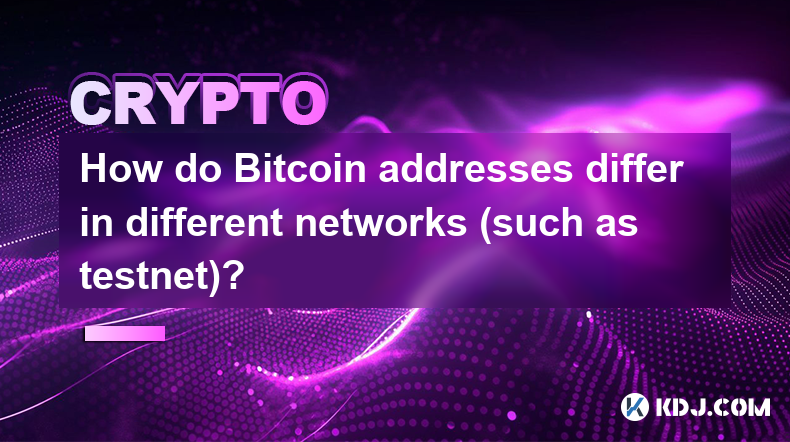
Bitcoin, despite its decentralized nature, operates on various networks. The most prominent are the mainnet (the live, production network) and testnets (used for testing and development). Understanding how addresses differ across these networks is crucial for developers and users alike. This article delves into the specifics of these differences and explores their implications.
Understanding Bitcoin Addresses and Network Differences
A Bitcoin address is a cryptographic hash representing a public key. It's essentially your receiving address where you can receive Bitcoin. This address is derived from your private key, which should be kept absolutely secret. The crucial difference between addresses on different networks lies in the network prefix, a crucial component baked into the address itself. This prefix acts as a unique identifier, signifying which network the address belongs to. This prevents accidental mixing of funds between mainnet and testnet.
Network Prefixes: The Key Differentiator
The mainnet uses a specific network prefix, while testnets (like the widely used Testnet3) employ different prefixes. These prefixes are encoded in the address itself. For example, a mainnet address starts with a '1' or a '3', while a Testnet3 address typically starts with 'm' or 'n'. These prefixes aren't arbitrary; they're integral to the address generation process and are crucial for routing transactions to the correct network. Failure to use the correct address will result in lost funds.
Generating Addresses on Different Networks
Generating addresses is a straightforward process, but the network you're working with significantly impacts the resulting address. This is handled automatically by most Bitcoin wallets.
- Mainnet: When you generate an address using a mainnet wallet, the software automatically incorporates the mainnet prefix.
- Testnet: Similarly, generating an address in a testnet wallet will automatically append the testnet prefix. This ensures your testnet Bitcoins (often called testnet BTC or tBTC) stay on the testnet.
This automated process simplifies the user experience, preventing accidental misuse of addresses.
The Importance of Network Distinction
The difference between mainnet and testnet addresses is not merely cosmetic; it's fundamental to the security and functionality of the Bitcoin ecosystem. Mixing mainnet and testnet addresses would lead to irreversible loss of funds. The network prefix ensures that transactions are routed correctly. Attempting to send mainnet Bitcoin to a testnet address, or vice versa, will fail.
Why Testnets Exist
Testnets are crucial for developers and users alike. They provide a safe environment to experiment with new software, test transactions, and learn about Bitcoin without risking real funds. The use of distinct addresses prevents accidental loss of real Bitcoin during testing. This allows developers to identify and resolve bugs before deploying them to the mainnet.
Common Wallet Behaviors and Network Selection
Most reputable Bitcoin wallets automatically handle network selection. You'll typically find settings to choose between mainnet and testnet. Some wallets even offer multiple testnet support, allowing interaction with various test networks. Always double-check the network your wallet is connected to before sending or receiving funds. Mismatched networks are a common source of user error.
SegWit and its Impact on Addresses
SegWit (Segregated Witness) introduced a new address format, starting with 'bc1' for mainnet and 'tb1' for testnet. While the underlying principles remain the same, SegWit addresses offer improved efficiency and security. However, the network distinction through prefixes continues to be crucial.
Address Formats and Their Significance
The variety of address formats (e.g., P2PKH, P2SH, Bech32) doesn't alter the fundamental principle of network distinction. Regardless of the address format, the network prefix remains the primary identifier. Each format has its own specific encoding, but the network prefix always precedes it.
Security Implications of Network Confusion
Using the wrong network can lead to permanent loss of funds. There's no recovery mechanism for sending Bitcoin to the wrong network. Always verify the network your wallet is connected to before performing any transactions. This is paramount to prevent costly mistakes.
Exploring Different Testnets
Beyond Testnet3, other testnets exist. These are often used for specific testing purposes or by individual developers. Each testnet has its own unique address prefix, maintaining the crucial distinction from the mainnet and other testnets. Always refer to the documentation of the specific testnet you're using.
The Role of Nodes in Network Distinction
Nodes in the Bitcoin network play a vital role in enforcing network separation. They verify the network prefix of each transaction, ensuring that funds are only transferred within the designated network. This prevents unauthorized movement of funds between mainnet and testnet.
Advanced Techniques and Network Awareness
Advanced users may interact with multiple networks simultaneously. However, maintaining strict separation and awareness of the active network is paramount. Using dedicated wallets or distinct software instances for each network is a best practice.
Frequently Asked Questions
Q: Can I send Bitcoin from a mainnet address to a testnet address?
A: No. Sending Bitcoin from a mainnet address to a testnet address will result in the irreversible loss of your funds. The networks are completely separate.
Q: Can I use the same private key on both mainnet and testnet?
A: No. While you might generate a private key and use it to derive addresses on both networks, this is generally not recommended and can be confusing. It is best practice to use separate wallets for mainnet and testnet.
Q: What happens if I accidentally send Bitcoin to the wrong network?
A: Your Bitcoin will be lost. There is no way to recover funds sent to the wrong network.
Q: How can I tell if an address is from the mainnet or a testnet?
A: Look at the prefix of the address. Mainnet addresses typically begin with '1' or '3' (or 'bc1' for SegWit), while testnet addresses often start with 'm' or 'n' (or 'tb1' for SegWit). The specific prefix depends on the testnet in use.
Q: Are there any tools to help me avoid network errors?
A: Many Bitcoin wallets have built-in features to prevent network errors. Always double-check your wallet's network settings before sending any transactions. Carefully review the receiving address to ensure it matches the intended network.
Disclaimer:info@kdj.com
The information provided is not trading advice. kdj.com does not assume any responsibility for any investments made based on the information provided in this article. Cryptocurrencies are highly volatile and it is highly recommended that you invest with caution after thorough research!
If you believe that the content used on this website infringes your copyright, please contact us immediately (info@kdj.com) and we will delete it promptly.
- Nigeria's New Investment Act (ISA) 2025 Officially Recognizes Cryptocurrencies as an Asset Class
- 2025-04-01 09:00:12
- Bitcoin (BTC) Halving Promises New All-Time Highs in 2025, But Will History Rhyme?
- 2025-04-01 09:00:12
- Elite Analyst Warns Bitcoin Holders: ‘Little to No Support’ Until $70k
- 2025-04-01 08:55:11
- Pre-Market Analysis: 3 Cryptocurrencies That Could Steal the Show in the Next Bull Run
- 2025-04-01 08:55:11
- Celo's Transition to an Ethereum L2 Blockchain Signals a Broader Industry Shift
- 2025-04-01 08:50:11
- Animoca Brands and Sony's Soneium blockchain are bringing anime culture into the web3 world
- 2025-04-01 08:50:11
Related knowledge
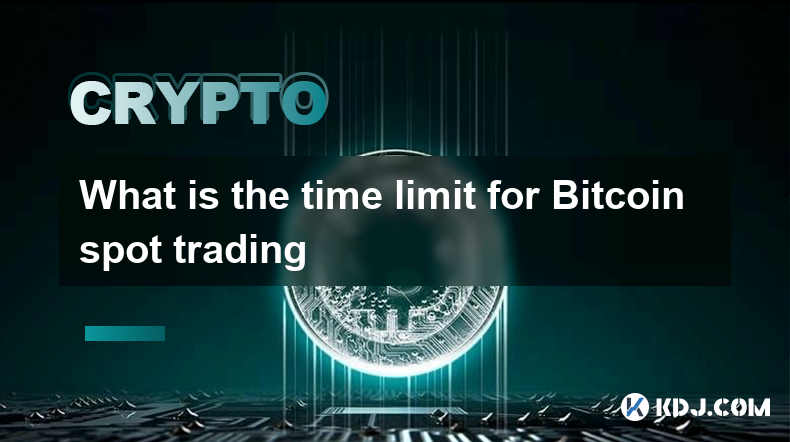
What is the time limit for Bitcoin spot trading
Mar 30,2025 at 10:43am
? There's no single, universally applicable 'time limit' for Bitcoin spot trading. Unlike futures contracts which have defined expiration dates, spot trading involves the immediate exchange of Bitcoin for fiat currency (or vice versa). The transaction is executed almost instantly, pending confirmation on the Bitcoin blockchain. However, several factors ...
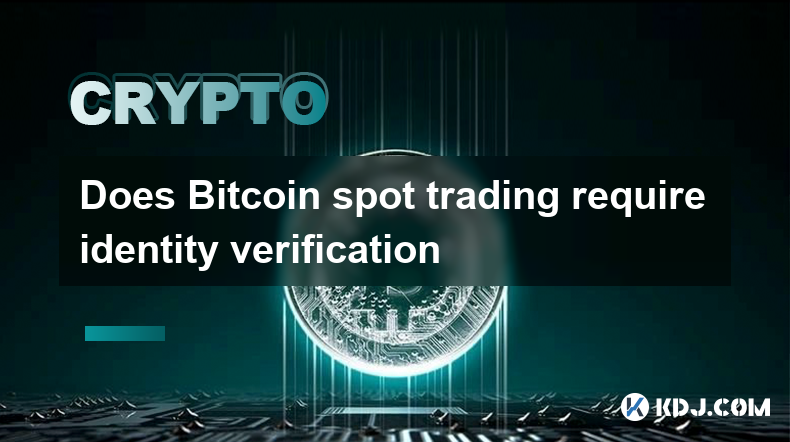
Does Bitcoin spot trading require identity verification
Mar 31,2025 at 06:08am
? Understanding KYC/AML Regulations in Crypto ExchangesThe question of whether Bitcoin spot trading requires identity verification hinges largely on the exchange you're using. There's no universal requirement for identity verification to trade Bitcoin spot. However, most reputable and larger exchanges operating globally implement Know Your Customer (KYC...
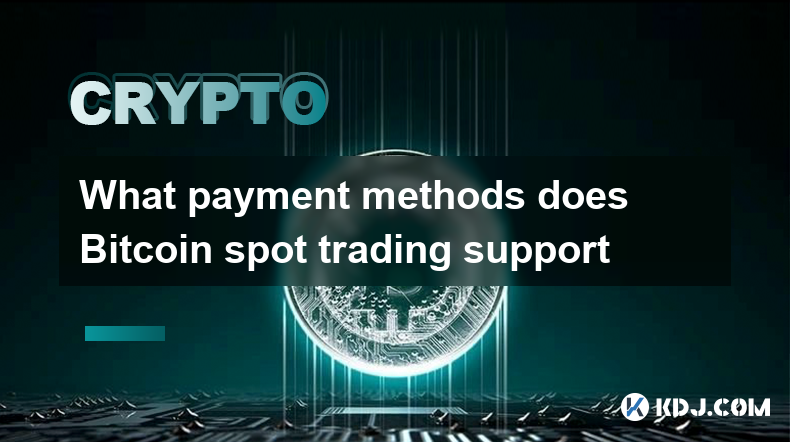
What payment methods does Bitcoin spot trading support
Mar 30,2025 at 12:43pm
? Understanding Bitcoin Spot Trading Payment MethodsBitcoin spot trading refers to the immediate exchange of Bitcoin (BTC) for another currency, typically fiat money like USD, EUR, or another cryptocurrency. Unlike futures or derivatives trading, spot trading involves the actual transfer of Bitcoin at the current market price. The payment methods accept...
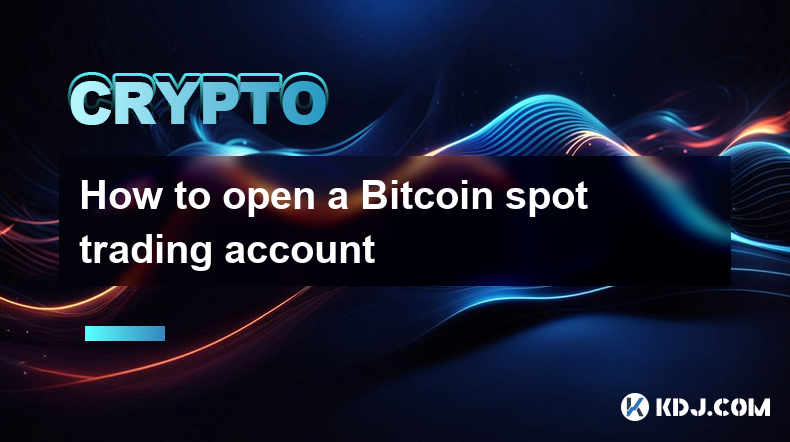
How to open a Bitcoin spot trading account
Mar 29,2025 at 12:43pm
Choosing the Right ExchangeOpening a Bitcoin spot trading account involves selecting a reputable cryptocurrency exchange. Several factors are crucial here. Consider the exchange's security features – look for two-factor authentication (2FA) and robust security protocols. Examine trading fees, as these can significantly impact your profits. Check the av...
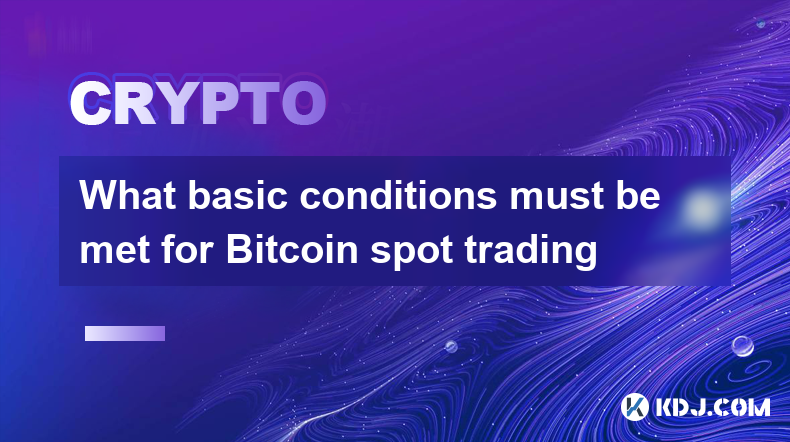
What basic conditions must be met for Bitcoin spot trading
Mar 29,2025 at 11:43pm
? Understanding the Prerequisites for Bitcoin Spot TradingBitcoin spot trading, unlike futures or derivatives trading, involves the immediate exchange of Bitcoin (BTC) for fiat currency (like USD, EUR, etc.) or another cryptocurrency. To engage in this, several crucial conditions must be met, both on the regulatory and practical fronts. Let's delve into...
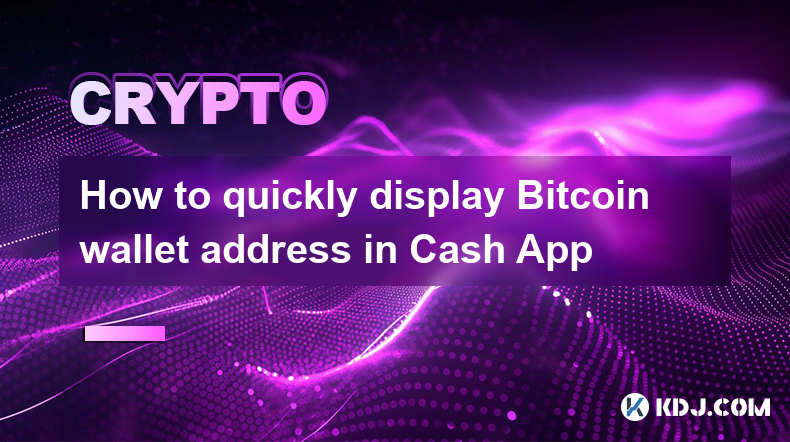
How to quickly display Bitcoin wallet address in Cash App
Mar 31,2025 at 06:35am
How to Quickly Display Your Bitcoin Wallet Address in Cash App Cash App, a popular peer-to-peer payment app, allows users to buy, sell, and hold Bitcoin. However, directly displaying your Bitcoin wallet address isn't as straightforward as some other crypto wallets. This article details how to access and share your Bitcoin address within the Cash App eco...

What is the time limit for Bitcoin spot trading
Mar 30,2025 at 10:43am
? There's no single, universally applicable 'time limit' for Bitcoin spot trading. Unlike futures contracts which have defined expiration dates, spot trading involves the immediate exchange of Bitcoin for fiat currency (or vice versa). The transaction is executed almost instantly, pending confirmation on the Bitcoin blockchain. However, several factors ...

Does Bitcoin spot trading require identity verification
Mar 31,2025 at 06:08am
? Understanding KYC/AML Regulations in Crypto ExchangesThe question of whether Bitcoin spot trading requires identity verification hinges largely on the exchange you're using. There's no universal requirement for identity verification to trade Bitcoin spot. However, most reputable and larger exchanges operating globally implement Know Your Customer (KYC...

What payment methods does Bitcoin spot trading support
Mar 30,2025 at 12:43pm
? Understanding Bitcoin Spot Trading Payment MethodsBitcoin spot trading refers to the immediate exchange of Bitcoin (BTC) for another currency, typically fiat money like USD, EUR, or another cryptocurrency. Unlike futures or derivatives trading, spot trading involves the actual transfer of Bitcoin at the current market price. The payment methods accept...

How to open a Bitcoin spot trading account
Mar 29,2025 at 12:43pm
Choosing the Right ExchangeOpening a Bitcoin spot trading account involves selecting a reputable cryptocurrency exchange. Several factors are crucial here. Consider the exchange's security features – look for two-factor authentication (2FA) and robust security protocols. Examine trading fees, as these can significantly impact your profits. Check the av...

What basic conditions must be met for Bitcoin spot trading
Mar 29,2025 at 11:43pm
? Understanding the Prerequisites for Bitcoin Spot TradingBitcoin spot trading, unlike futures or derivatives trading, involves the immediate exchange of Bitcoin (BTC) for fiat currency (like USD, EUR, etc.) or another cryptocurrency. To engage in this, several crucial conditions must be met, both on the regulatory and practical fronts. Let's delve into...

How to quickly display Bitcoin wallet address in Cash App
Mar 31,2025 at 06:35am
How to Quickly Display Your Bitcoin Wallet Address in Cash App Cash App, a popular peer-to-peer payment app, allows users to buy, sell, and hold Bitcoin. However, directly displaying your Bitcoin wallet address isn't as straightforward as some other crypto wallets. This article details how to access and share your Bitcoin address within the Cash App eco...
See all articles























































































